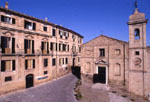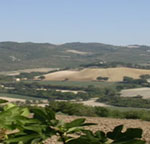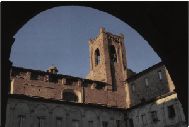Il
sabato del villaggio



che 'l sul l'è près calè,
cun an gran fas d'èrbi e l'ha anche 'n man
al so bèl masitìn ad rözi e 'd viòli,
parchè,mè sémp,dumàn,
al dì dla fèsta völ bütèsi
'nsla stòmi e 'nti cavéi.
Satà ansìma la scàla,
cun ia vzìn'i,la fìla la vigëta,
e l'è girà ver là 'ndùa al sul snu va;
e la cünta sü dla so giuventü,
quand ancù san'a e ardìa
's pudìva alùra dì, na bèla fìa
e tanti giùvu iéru antùrn a lé.
Giàl'aria, di sa part, l'è près gnì scüra,
sa s'ciarìs al serén e i calu i òmbri
giü dal mont e dai cà
al ciar dla lün'a che l'è già spuntà.
Dès ai son'i i campàn'i
che dumàn l'è festa;e sa vus, as dirìa,
che 'n cör büta alegrìa.
I maznà 'nsla piasëta,i giögu,i crìu,i sàutu,
i fan an ciadèl ca l'è fin'a bèl:
e 'ntant a turna ver la povra sé'na
l'om cun la sapa,e 'l sübia par la via,
pensànd che anche lü dumàn s'arpìa.
Pö,quand daspartüt ién smursàsi i luci,
e 'nturn iè 'n gran silensiu,
as sént bàti 'l martèl,criè la rèsia,
dal mesdabòsc rastà 'ntla so butéga
che 'l cüra 'l so travài e 'ldéu finìlu
prima che fàga ciar dumàn matin'a.
Cust ad tüti i sèt dì l'è püsè bel,
pién ad cuntantësa,pién da speransa:
dumàn turnu i sagrìn,
turna la nòia ad fè semp al travài ad tüti i dì,
e tüti andén a iàn as pensé li.
Car giuvnutìn che t'è vòia 'd giughè,
la to età fiurìa
l'è tam mè 'n dì che sìa pién d'alegrìa,
an dì ciar e serén,
sarìa mè dì la vigilia dla fèsta dla to vita.
I völ nen dìti àut,
sa fèsta chi,
àbia nen prèsa se la tarda a gnì.
and the moon rests in the gardens,
calm on the roofs, and reveals, clear,
far off, every mountain. O my lady,
the paths are still, and the night lights
shine here and there from the balconies:
you sleep, and sleep gently welcomed you
to your quiet room: nothing
troubles you: you still donít know, or guess
with how deep a wound youíve hurt my heart.
You sleep: I gaze at the sky
that seems so kind to my eyes:
gaze on ancient all-powerful Nature,
who created me for pain. She said:
ĎI refuse you hope, even hope, and may
your eyes not shine, except with tears.í
Today was holy: now rest
from pleasure, remember in dream, perhaps,
how many you liked today, how many
liked you: not I, itís not I that hope
to fill your thoughts. Instead I ask
what life has left me, throw myself
to earth, cry out, and tremble: oh,
terrible days of green youth! Ah, on the road
nearby, I hear the solitary song
of the worker returning to his poor
lodging, late, after the revels:
and it grips my heart fiercely
to think the whole world passes,
and scarcely leaves a trace. See: the holidayís
over: some nondescript day follows:
time carries off all mortal things.
Where nowís the sound of all those
ancient peoples? Where are the cries
of our famous ancestors, Romeís
vast empire, its weapons, the clash
of arms, crossing land and sea?
Allís peace and silence: the world
rests entirely, and we speak of them no more.
Now I remember, in my young days,
when the longed-for holiday was awaited,
how, once it had passed, I lay, in sadness,
pressed tight to my sheets: and, deep in the night,
a song I heard in the streets,
died, little by little, far off,
crushing my heart, as now.
In sul calar del sole,
Col suo fascio dell'erba; e reca in mano
Un mazzolin di rose e di viole,
Onde, siccome suole,
Ornare ella si appresta
Dimani, al dì di festa, il petto e il crine.
Siede con le vicine
Su la scala a filar la vecchierella,
Incontro là dove si perde il giorno;
E novellando vien del suo buon tempo,
Quando ai dì della festa ella si ornava,
Ed ancor sana e snella
Solea danzar la sera intra di quei
Ch'ebbe compagni dell'età più bella.
Già tutta l'aria imbruna,
Torna azzurro il sereno, e tornan l'ombre
Giù da' colli e da' tetti,
Al biancheggiar della recente luna.
Or la squilla dà segno
Della festa che viene;
Ed a quel suon diresti
Che il cor si riconforta.
I fanciulli gridando
Su la piazzuola in frotta,
E qua e là saltando,
Fanno un lieto romore:
E intanto riede alla sua parca mensa,
Fischiando, il zappatore,
E seco pensa al dì del suo riposo.
Poi quando intorno è spenta ogni altra face,
E tutto l'altro tace,
Odi il martel picchiare, odi la sega
Del legnaiuol, che veglia
Nella chiusa bottega alla lucerna,
E s'affretta, e s'adopra
Di fornir l'opra anzi il chiarir dell'alba.
Questo di sette è il più gradito giorno,
Pien di speme e di gioia:
Diman tristezza e noia
Recheran l'ore, ed al travaglio usato
Ciascuno in suo pensier farà ritorno.
Garzoncello scherzoso,
Cotesta età fiorita
È come un giorno d'allegrezza pieno,
Giorno chiaro, sereno,
Che precorre alla festa di tua vita.
Godi, fanciullo mio; stato soave,
Stagion lieta è cotesta.
Altro dirti non vo'; ma la tua festa
Ch'anco tardi a venir non ti sia grave.